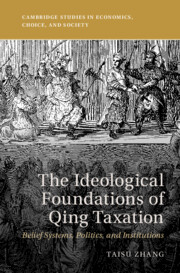‘A theoretically elegant, evidence-rich, and innovative explanation for why imperial China declined and fell. The Ideological Foundations of Qing Taxation sheds light on the roots of the ‘Great Divergence’ in economic development between China and Europe. A tremendous achievement that deserves to be widely read.’
Yuhua Wang - Professor of Government, Harvard University
‘This book is a brilliant new take on comparative economic history. Skillfully integrating institutional analysis, economics, and political thought, Zhang provides us with an erudite, deeply learned account of the Qing’s failure to expand tax capacity, drawing us into contemplation of a path not taken.’
Tom Ginsburg - Leo Spitz Distinguished Service Professor of International Law, University of Chicago
‘In this refreshing and incisive work, Taisu Zhang shows us how the weakness of the late Qing regime depended less on structural constraints than on a specific worldview about the proper role of the state. Low taxation was a deliberate choice, made in response to the presumed lessons of history, and it would have far-reaching implications. This will be of interest to anyone who wants to understand long trends in Chinese political development.’
David Stasavage - Julius Silver Professor, New York University
‘In this characteristically ambitious book, Taisu Zhang looks for obstacles on China’s path to modernization in a surprising place: tax capacity. He explains the unwillingness of China’s nineteenth-century rulers to raise taxes neither in terms of eternal cultural values nor structural factors, but rather as the outcome of a specific type of conservatism that can be explained historically.’
Michael Szonyi - Frank Wen-hsiung Wu Professor of Chinese History, Harvard University
‘Why did the Qing empire consistently under-tax its agricultural base? This book invites one to the backroom of emperors and statesmen as they debated fiscal policy, and performs a masterful dissection of the long-term ideological forces at work. A gripping read.’
He Bian - Associate Professor of History, Princeton University



